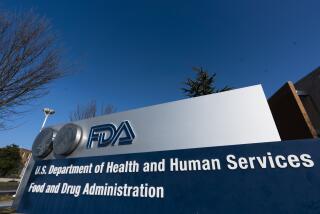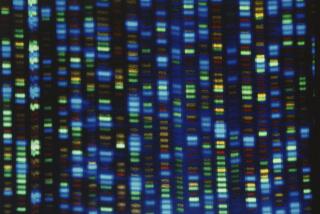Op-Ed: Why whole-genome testing hurts more than it helps
President Obama proposes to plunk down $215 million on “precision medicine,” and the National Institutes of Health and its National Cancer Institute will spend it by sequencing the whole genome of a million or more Americans.
Is whole-genome testing the path to health? The short answer is no.
The main problem with the proposal is that the research is bound to produce more noise than signal. The issue isn’t genetics but “big” data. The basic idea of precision medicine is to look for patterns in the genome that seem to travel with problems we all care about: diabetes, heart disease, cancer and dementia. But there are a lot of possible patterns to look for.
Imagine there were only 10 data points in a person’s genome and that each point could only take on one of two values: red or green. The first could be red or green, the second red or green and so forth. The number of possible patterns that could emerge from those 10 data points is 2 to the 10th power — 1,024 patterns. It goes up fast from there: 20 data points would produce more than 1 million patterns.
Among the 3 billion data points in the genome, geneticists believe that each of us has at least hundreds — probably thousands — that vary in ways that could affect our health. So the number of potential patterns is astronomical.
With all those patterns to explore in a million or more Americans — who have hundreds of diagnoses — the initiative is bound to identify a whole bunch of apparent relationships.
A few years ago statisticians in Canada highlighted the big-data problem. They looked at the relationship between astrological signs and hospital diagnoses in 5 million admissions in Ontario. They found that Leos were significantly more likely to be admitted for digestive tract bleeding and that Sagittarians were significantly more likely to be admitted for upper-arm fractures.
Not that anyone actually believes that astrological signs are responsible for specific hospital diagnoses. (OK, maybe someone does, but we don’t believe him.)
Too much noise is only one part of the big-data problem. Whatever signals are found are bound to be weak.
There are some strong signals in the genome, such as rare mutations that increase the risk of colon cancer some tenfold. And there may be value in selectively looking for these signals. But we don’t need to test the whole genome to find them.
For the most part, these signals are already known; they didn’t require big data. If your mother, your mother’s mother, two of your three sisters and half of your cousins all had a disease — a genetic basis was obvious. Breast cancer mutations, for example, were identified in such families.
So with much of the low-hanging fruit gone, what’s left for precision medicine? Genetic patterns that are associated with changes in risk of a few percentage points — for example, increasing your chance of developing Disease X from 4% to 6%.
Make no mistake about it: These data will scare people — particularly since they are likely to be framed as a 50% increase in your risk of Disease X. But it’s just as likely they won’t make a difference in your health.
That’s because weak signals can’t tell us what to do. For example, what should doctors do differently for someone with a slightly higher risk for colon cancer and Alzheimer’s disease and a slightly lower risk of lung cancer and diabetes? Increase the frequency of screening and Sudoku puzzles? Tell him it’s fine to smoke and gain weight?
And yet there will be substantial pressure for doctors to do something, which typically translates into a haphazard process of more testing and more intervention. Some interventions may help a little; others may harm people; still others may have no impact at all.
The reality is that it’s hard to predict the future — and it’s even harder to know what to do about it.
And don’t make the mistake of thinking whole-genome data are going to save the healthcare system money, no matter how cheap sequencing becomes. Patients will waste doctors’ time chasing the weak signals; doctors will then waste medical resources “doing something.” Will your insurance cover all of this? Don’t count on it.
But cost isn’t the only issue. No amount of genetic data will ever change the fact that most of us need to eat better and move more. Yet explaining “predictive” data in a 10- to 15-minute office visit will divert attention from more important topics. Equally important is the attention of the medical research enterprise, where all this emphasis on predicting disease will divert researchers from more fundamental questions: How do we best treat clinically evident disease? How do we prevent it?
Furthermore, the focus on molecular pathology only reinforces the assumption that health is a set of specified physical measurements and the absence of any detectable abnormality. Because all of us harbor abnormalities, and because our technologies are increasingly able to find them, the disturbing truth is that this is a recipe for making all of us feel sick.
Of course there is a lot of enthusiasm for the effort. Academic medical centers and biotechnology firms, in particular, love this stuff. For the medical-industrial complex, it is potentially a huge revenue stream. For most people, however, whole-genome sequencing is an absurd medical test. If you get entertainment value from a fortune-teller reading — or from a whole genome — that’s one thing. But if you value your health, divert your resources to something more meaningful — maybe whole foods.
H. Gilbert Welch is a professor of medicine at Dartmouth Medical School and the author of “Less Medicine, More Health: 7 Assumptions that Drive Too Much Medical Care.” Wylie Burke is a medical geneticist and professor at the University of Washington.
Follow the Opinion section on Twitter @latimesopinion and Facebook
More to Read
A cure for the common opinion
Get thought-provoking perspectives with our weekly newsletter.
You may occasionally receive promotional content from the Los Angeles Times.










